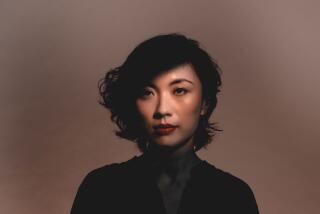Desperately Seeking Someone
When Wei Hui, author of the racy Chinese novella “Shanghai Baby,” was born in 1972, China was entering the final years of the Great Proletarian Cultural Revolution. Mao Tse-tung was in political and physical decline; Nixon had just climbed the Great Wall. The doors were opening. China would begin itsmove from grayness and destruction toward recuperation, longing for those days when life was more than a constant struggle against “counterrevolutionaries” and “bourgeois liberals.”
As Wei Hui, the pen name of Shanghai pop sensation Zhou Weihui, entered elementary school in 1979, the wounds the Cultural Revolution had inflicted on the psyche of an older generation had opened on the pages of “scar literature.” Each line spoke of a physical, psychological, emotional and ideological oppression that many Americans and Wei Hui, the young author so comfortable with cell phones and discotheques, cannot begin to comprehend. As Wei Hui began middle school, feminist authors attempted to take Chinese women out of their Mao jackets and unisex trousers, to bare their sexual and emotional needs. Authors of the “Search for Roots” movement wrote of a China they had never known, that no one had ever known. The obsessive need to recover what had been lost in the destruction of buildings and families and mores was paramount. The realization would come, however, that it could never be reclaimed.
The upbeat chatter and vigorous, naive strides that began on the campus of Beijing University on a May morning in 1989, the hushed debate and heated argument, the empowered footsteps eventually weakened by hunger, slowed by a rising political debacle and halted by military might, perhaps went unknown to a teenage Wei Hui. Urban fiction soon reared its head; “take it to the limit, then die” was the Jack Kerouac-inspired motto of the illustrious “hoodlum” author Wang Shuo, and Chinese at home and abroad laughed with abandon at his hoodlum farces.
By the mid-1990s, women writers were pushing the limits of literary creativity. Female protagonists were often narcissistic, responding to their emotional and sexual needs. Women--not women and the men they love--peopled bookshelves. The sexual exploits of fictional characters ruffled the feathers of the authorities and titillated the senses of China’s Generation X--and their parents and grandparents.
Dialect and slang slipped easily into the vocabularies of authors and censors alike. “Fiction for the masses,” the unsuccessful project of the 1950s and 1960s, reached fruition in the 1990s. China had been primed for Zhou Weihui; China was more than ready for “Shanghai Baby.”
Coco sits alone, in a skimpy nightie, smoking, ruminating, writing. Her impotent boyfriend Tian Tian flutters through her life, harbors resentment toward a mother who abandoned him for a life in Spain and slides down the slippery slope of addiction. Mark is the dashing ex-pat who seduces Chinese women in the toilet stalls of trendy nightspots, then returns home to share a reassuring long-distance call with his wife and child in Germany. Coco loses herself in him, finds herself in him, then steals his wedding ring the night before he is to return to his family--because that’s what these men do, return to their families.
If Coco/Wei Hui is Shanghai’s “baby,” the city of Shanghai has always been China’s “baby.” The word for “baby” in Chinese, baobei , can mean a number of things: treasure, darling and, sarcastically, thorn in one’s side. There is perhaps no other place within its oft-disputed borders that can enamor and irk China as much as Shanghai can. The city that witnessed the founding of the Chinese Communist Party is also China’s most capitalist, most fashionable, most cultured, the thorn in China’s side. Shanghainese call non-Shanghainese, including Beijingers, “countrysiders.” If Wei Hui had been a Beijinger, from the cold seat of China’s government, this novel would never have been written.
The media-savvy Wei Hui is talented and has a knack for packaging herself. She is one of China’s meinu zuojia , or “pretty women writers,” and her photo is on the cover, not the inside flap as is more common in China, of each of her books.
Her often raunchy coming-of-age story might even convince you that hers is the “new China,” that Coco is the “new Chinese woman.” Don’t be fooled. Timeworn stereotypes persist. Chinese men can’t pleasure their women and foreigners grow more virile each day. This is mass literature of the Harlequin Romance type. Some have called it the “new” Chinese urban literature, but “Shanghai Baby” is nothing new. With each spectacular and very moving line comes a mediocre paragraph. After all, she is young. She was never “sent down” to the countryside or imprisoned for her “underground” activities. We can’t expect her to be interested in this history, nor can we expect her to champion the struggles of women everywhere.
Wei Hui can thank the Chinese censors for a large portion of her success. She may begin to despise them. The power is no longer hers. China’s banning of “Shanghai Baby” because of its “immoral” content has brought her fame and fortune, but she may also be unable to publish there in the future. She may be doomed to write short pieces for Hong Kong newspapers, relinquishing the inspiration to create publishable fiction.
Perhaps the one thing that says Wei Hui will move beyond “Shanghai Baby” is Coco’s realization that, whether in the arms of a foreign lover or chasing after a fatalistic boyfriend, whether surrounded by decadent artist friends or sharing a polite moment with her lover’s wife, Coco, writers, women are ultimately alone. It is this solitude that redeems Coco. It is this very mature realization that leaves hope for Wei Hui the author and makes “Shanghai Baby” more than just a marketable pretty face.
More to Read
Sign up for our Book Club newsletter
Get the latest news, events and more from the Los Angeles Times Book Club, and help us get L.A. reading and talking.
You may occasionally receive promotional content from the Los Angeles Times.






